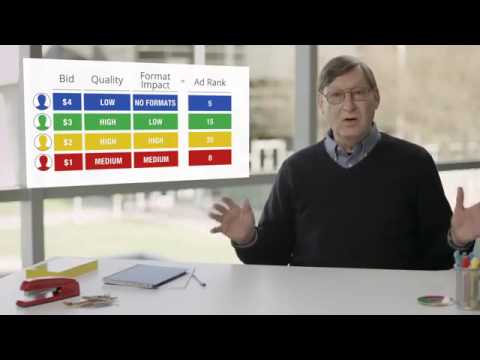- google keyword bidding
- Google Ads Bidding Options
- Participating In The Google Auction
- Different Bidding Options: Clicks, Impressions, Conversions, And Views
- Cost Per Action (CPA) Bidding For Conversions
- Cost Per View (CPV) Bidding For Video Ads
- Setting Maximum CPV Bids
- Two Options For Keyword Bidding: Automated Maximize Clicks And Manual CPC
- Using Google Ads Tools For Keyword Bidding
In today’s highly competitive digital landscape, businesses strive to make their mark and reach their target audience effectively. One powerful tool that has revolutionized online advertising is GoogleAds.
With its wide range of bidding options, GoogleAds empowers advertisers to maximize their visibility, enhance their conversions, and ultimately achieve their business goals. Among these bidding options, Google keywordbidding stands out as a fundamental strategy to get your ad in front of the right people at the right time.
So, if you’re ready to unlock the potential of Google keyword bidding to propel your business forward, join us as we delve into the world of strategic bidding, high ROI, and unrivaled opportunities with Google Ads.
| Item | Details |
|---|---|
| Topic | Google Keyword Bidding: Unlocking the Secrets to Success |
| Category | Marketing |
| Key takeaway | In today's highly competitive digital landscape, businesses strive to make their mark and reach their target audience effectively. |
| Last updated | December 28, 2025 |
google keyword bidding
Google keyword bidding refers to the process in Google Ads where advertisers compete in an auction to have their ads shown when specific keywords are searched. There are two options for keyword bidding: automated Maximize Clicks bid strategy and manual CPC bidding.
With manual CPC bidding, advertisers can manage their maximum cost-per-click (CPC) bids themselves. Advertisers can also utilize Google Ads tools to choose a keyword bid and make bid adjustments.
The Bid Simulator tool helps run “what-if” scenarios to adjust bids based on potential outcomes. Conversion tracking highlights which keywords drive desired actions, enabling informed bid adjustments.
Additionally, different types of keyword bid estimates offer insights into the necessary bidding to secure specific ad positions on the first page of search results.Key Points:
- Google keyword bidding is a process in Google Ads where advertisers compete in an auction to have their ads shown when specific keywords are searched.
- There are two options for keyword bidding: automated Maximize Clicks bid strategy and manual CPC bidding.
- With manual CPC bidding, advertisers can manage their maximum cost-per-click (CPC) bids themselves.
- Advertisers can use Google Ads tools to choose a keyword bid and make bid adjustments.
- The Bid Simulator tool helps run “what-if” scenarios to adjust bids based on potential outcomes.
- Conversion tracking highlights which keywords drive desired actions, enabling informed bid adjustments.
Sources
https://support.google.com/google-ads/answer/2472712?hl=en
https://support.google.com/google-ads/answer/2459326?hl=en
https://ads.google.com/intl/en_us/home/tools/keyword-planner/
https://www.newbreedrevenue.com/blog/understanding-keyword-bidding
Check this out:
💡 Pro Tips:
1. Consider using automated bidding strategies: In addition to manual CPC bidding, Google Ads offers automated bidding strategies like Maximize Clicks. These strategies use machine learning to optimize bids based on your budget and goals.
2. Don’t overlook the power of conversion tracking: By tracking which keywords are leading to desired actions, you can make informed bid adjustments. This ensures that you’re investing in the keywords that are generating the most valuable results.
3. Use the Bid Simulator tool: This tool allows you to run “what-if” scenarios to see how different bid adjustments could impact your campaign performance. It can help you make more strategic bidding decisions.
4. Take advantage of different bid estimates: Google Ads provides estimates for different types of keyword bids. These estimates can give you insights into the bidding required to achieve specific ad positions on the first page of search results.
5. Regularly review and adjust your maximum bids: Keep an eye on your campaign performance and adjust your maximum bids as needed. This will help you stay competitive and optimize your ad placement.
Google Ads Bidding Options
Google Ads provides advertisers with a range of bidding options to suit their specific goals and objectives. These options include clicks, impressions, conversions, and views.
Advertisers have the flexibility to choose the bidding strategy that aligns with their campaign objectives and budget.
One of the key aspects of bidding on Google Ads is participating in an auction where Google determines which ads will be displayed. Advertisers compete against each other in real-time for ad placements based on keyword relevance, ad quality, and bid amount.
New optimization tactics included — stay ahead.
Participating In The Google Auction
When it comes to participating in the Google auction, advertisers have the option to pay per click (PPC), per viewable impression, or set a cost per action (CPA) for conversions. Paying per click means that advertisers only pay when someone clicks on their ad.
Paying per viewable impression ensures that advertisers are charged when their ad is viewable to users. Setting a CPA allows advertisers to pay only when a specific action, such as a purchase or sign-up, is completed.
The auction determines the ad rank, which determines the position of an ad on the search results page. Ad rank is calculated by taking into account factors such as bid amount, ad quality, expected impact of ad extensions and other ad formats, and the context of the user’s search query.
Different Bidding Options: Clicks, Impressions, Conversions, And Views
Google Ads offers a variety of bidding options to cater to different campaign goals. Advertisers can choose to focus on maximizing clicks, impressions, conversions, or views.
For campaigns focused on generating website traffic, maximizing clicks is a suitable strategy. This bidding option aims to get the maximum number of clicks within the set budget.
Impression-based bidding is useful for campaigns aimed at increasing brand visibility and awareness. Advertisers are charged for every 1,000 impressions their ad receives.
Conversions are a crucial metric for many advertisers. With conversion-based bidding, advertisers can set a target cost per acquisition (CPA) and Google will optimize bids to maximize conversions within the specified CPA.
Video ads have their own unique bidding option called cost per view (CPV). Advertisers are charged for video views and interactions.
This bidding option is ideal for campaigns focused on video content promotion.
Cost Per Action (CPA) Bidding For Conversions
Cost per action (CPA) bidding in Google Ads allows advertisers to focus on paying for engaged views or clicks that lead to conversions. This bidding option is particularly beneficial for advertisers who prioritize getting users to take specific actions, such as making a purchase or filling out a form.
With CPA bidding, advertisers set a target cost per conversion and Google automatically adjusts bids to achieve the desired CPA. This automation ensures that advertisers are efficiently allocating their budget towards actions that matter the most to their business.
Cost Per View (CPV) Bidding For Video Ads
For advertisers running video ad campaigns, cost per view (CPV) bidding provides an effective way to pay for video views and interactions. With CPV bidding, advertisers only pay when a user engages with their video ad, such as by watching a certain duration of the video.
By utilizing CPV bidding, advertisers can ensure that their budget is allocated towards users who are actively engaging with their video content. This bidding option can help maximize the impact of video ads and optimize campaign performance.
Setting Maximum CPV Bids
When utilizing CPV bidding for video ads, advertisers have the option to set their maximum CPV bid. This bid determines the maximum amount an advertiser is willing to pay for a video view or interaction.
Setting a maximum CPV bid provides control over campaign costs and helps advertisers stay within their budget constraints. Advertisers can adjust their maximum CPV bids based on their campaign objectives and the value they place on video views and interactions.
Two Options For Keyword Bidding: Automated Maximize Clicks And Manual CPC
When it comes to keyword bidding, Google Ads offers two primary options: automated Maximize Clicks bid strategy and manual cost-per-click (CPC) bidding.
Automated Maximize Clicks bidding is a smart bidding strategy that adjusts bids in real-time to maximize the number of clicks within the specified budget. This option takes advantage of Google’s machine learning algorithms to automatically optimize bids and drive the most relevant traffic to the advertiser’s website.
On the other hand, manual CPC bidding allows advertisers to take full control over their maximum CPC bids. Advertisers can set their own bid amounts based on their desired cost per click and campaign goals.
Manual CPC bidding provides the flexibility to adjust bids on a keyword-by-keyword basis.
Using Google Ads Tools For Keyword Bidding
Google Ads provides a range of tools to assist advertisers in choosing the right keyword bid and making bid adjustments. These tools enable advertisers to make data-driven decisions and optimize their campaign performance.
The Bid Simulator tool is particularly useful when exploring different bidding scenarios. It allows advertisers to run “what-if” simulations to understand the potential outcomes of adjusting their bids.
This tool provides valuable insights into the impact of bid changes on ad performance and can inform bidding strategies.
Conversion tracking is another essential tool for keyword bidding. It enables advertisers to track which keywords are driving desired actions, such as purchases or sign-ups.
By analyzing the performance of different keywords, advertisers can make informed bid adjustments to optimize their campaigns for maximum conversions.
In addition, Google Ads offers various keyword bid estimates. These estimates provide insights into the bidding required to achieve specific ad positions on the first page of search results.
By understanding the estimated bid ranges, advertisers can better position their ads and increase their chances of reaching their target audience effectively.
In conclusion, Google Ads offers a diverse range of bidding options, including clicks, impressions, conversions, and views. Advertisers can choose the bidding strategy that aligns with their campaign goals and objectives.
Whether it’s focusing on maximizing clicks, optimizing for conversions, or promoting video content, Google Ads provides the tools and flexibility to help advertisers achieve success. By leveraging the available bidding options and utilizing powerful tools, advertisers can unlock the secrets to success in Google keyword bidding.
Self-Serve DSP Platform • Advertising Platform for Marketers • Programmatic Advertising • Buy Traffic











